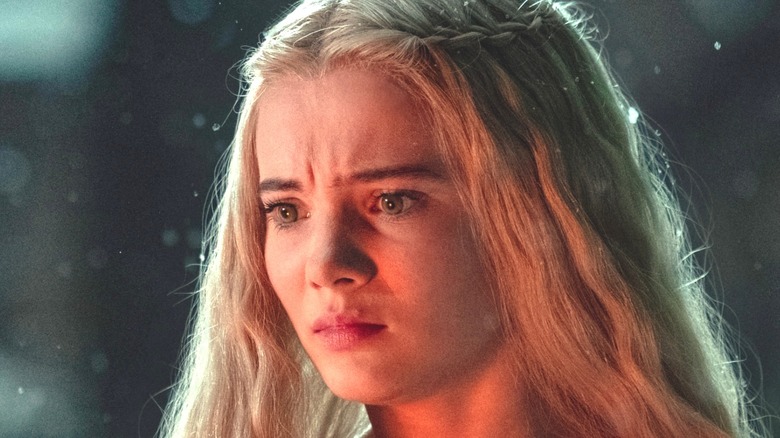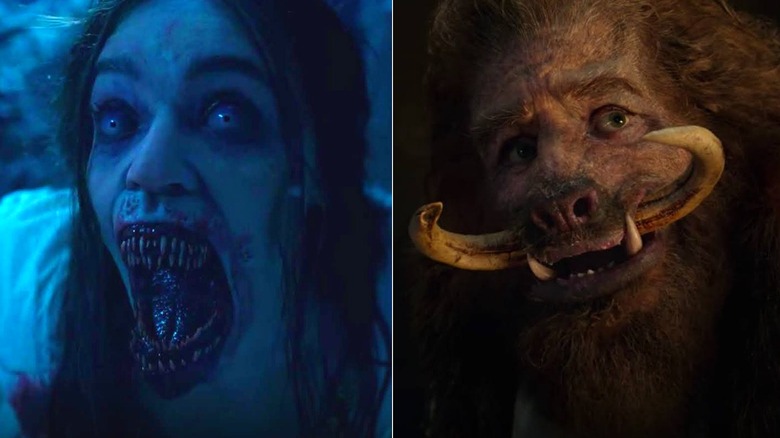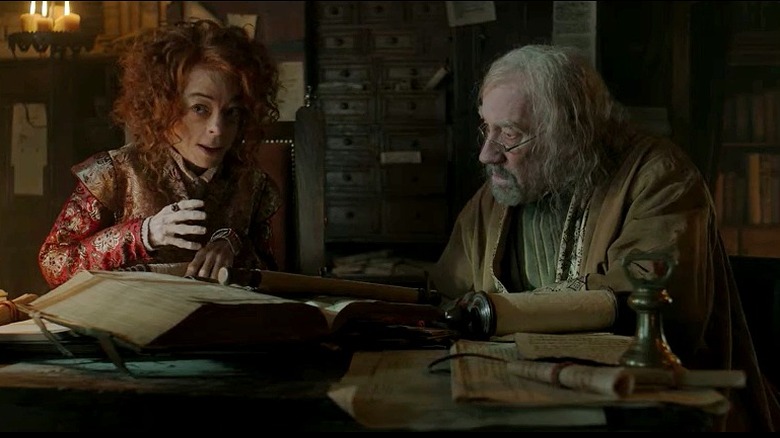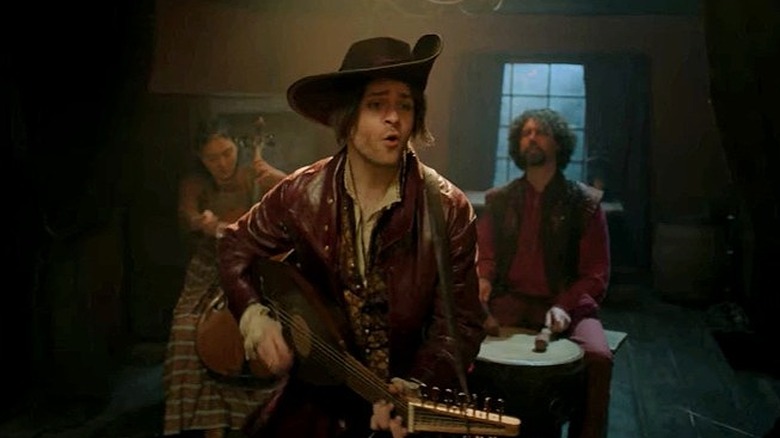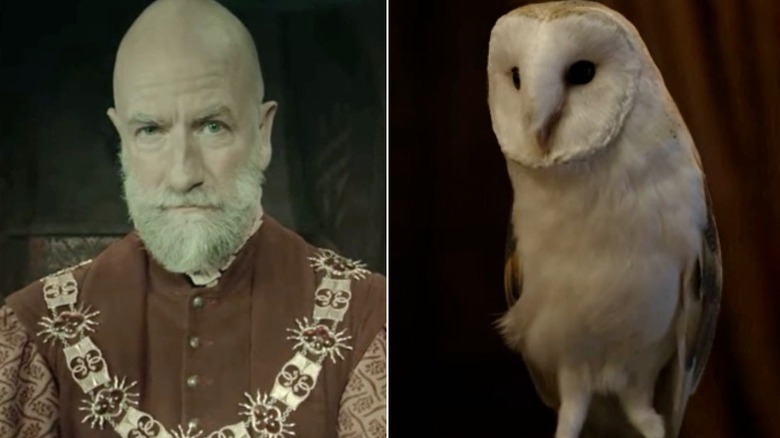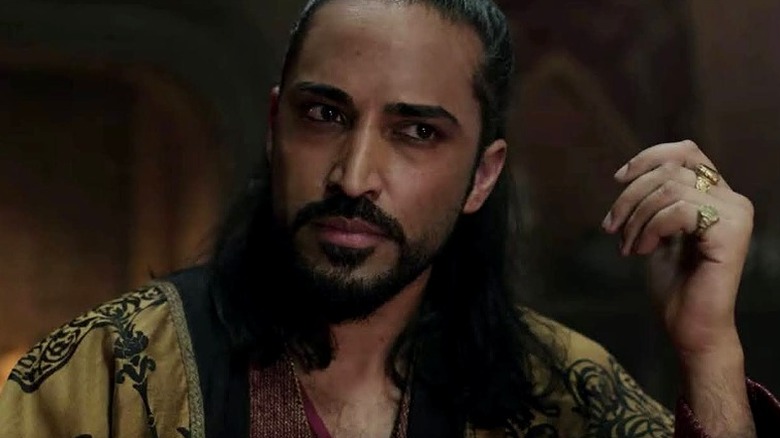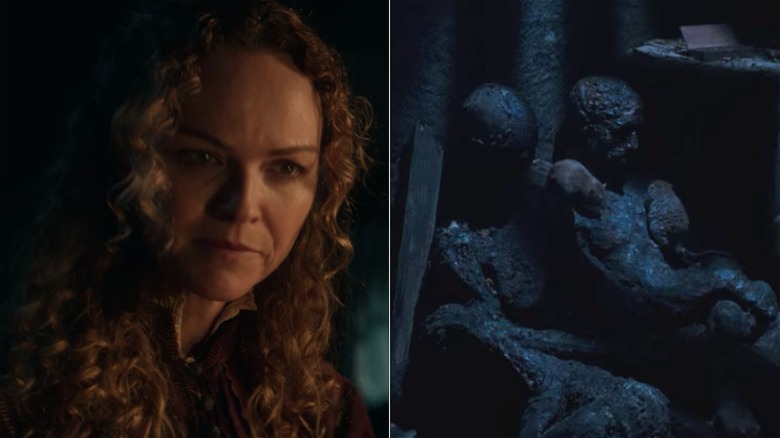Characters In The Witcher Season 2 That Mean More Than You Realize
Contains spoilers for "The Witcher" Season 2
After a long and trying wait for Season 2 of "The Witcher," Lauren Schmidt's Netflix adaptation of Andrzej Sapkowski's beloved fantasy saga finally premiered on Dec 17th, picking up where it left audiences eagerly hanging nearly two years ago in Season 1. Starring Henry Cavill as white-haired witcher Geralt of Rivia, Anya Chalotra as the powerful and conflicted mage Yennefer of Vengerberg, and Freya Allan as the young protagonist Princess Cirilla of Cintra (aka "Ciri"), the sophomore season brought with it a litany of new faces, characters, storylines, subplots, and (of course) songs, each of which could be written about at-length considering the series' intricate and complex source material.
In a universe that involves so many characters, it can be easy to overlook those who either don't receive much screen-time, or don't, at any point, come off as overtly ominous, magical, malevolent, or integral to the primary storyline. But as Lars Mikkelsen's mistrusting sorcerer Stregobor reminds Istredd (Royce Pierreson) in Season 2, Episode 3, "the only certainty on this continent ... is that no one is ever what they seem." For all his faults, Stregobor makes a valid point. And just as certain characters prove to be more than what they appear in Sapkowski's short stories and novels, numerous characters in Schmidt's dazzling adaptation deserve a more thorough investigation than their initial introduction might suggest.
Vereena and Nivellen aren't just a cursed couple
It might seem odd that Season 2 of "The Witcher" kicked off with a portrayal of Sapkowski's short story "A Grain of Truth" rather than diving into the overarching storyline. However, it makes perfect sense to consider just how much legwork the first episode of the Netflix adaptation has to do concerning the greater themes its narrative seeks to dissect. Like any epic proactively engaged in political allegory, "The Witcher" saga highlights the relative nature of right and wrong, just and unjust. "Justice," to one side of a given conflict, is depicted as murderous and unjust by the other — such is the reality of warfare and historical discord. But without some hard lines to run up against, that exploration of duality and shifting ideologies loses all meaning. Thus, just as it does in the novels, the relationship between the cursed boar-man Nivellen and the voracious bruxa Vereena establishes these lines and clarifies for the viewer where exactly the boundaries are when it comes to right and wrong.
For his part, Nivellen (Kristofer Hivju) helps establish that the act of rape and putting one's own selfish needs before those of an entire village are unjustifiable, unforgivable, and monstrous. As he tells Ciri (before confessing his rape of a young priestess), "Monsters are born of deeds done. Unforgivable ones." As for the bloodthirsty bruxa Vereena (Agnes Bjorn), Geralt identifying her as a monster establishes that the murder of children and other innocents — again, to feed one's own needs — is equally unjustifiable, unforgivable, and monstrous. Neither character takes up much space in either the series or its source material, but they loom large concerning the universe's moral boundaries. As a bonus, Nivellen also introduces the importance of love and blood in the universe and shares the story of Lara Dorren and Cregennan of Lod, whose romance will prove vital regarding Ciri's lineage and future.
Codringher and Fenn hold the universe's most powerful weapon
It's safe to say that if there's one thing we know about the history and lore of The Continent in "The Witcher," it's that more often than not the product of biased propaganda masters or political agendas than it is actual reliable fact. With little exception, the stories we hear about how various species, mutants, or monsters came to be should be taken with a grain of salt. In the novels, this is Sapkowski's way of calling out the fallibility of the history that empires, countries, and oppressive regimes have used to justify their acts of hate and violence for centuries. In the series, it makes for a compelling questioning of everything we think we know.
But there are two people in the universe for whom fact is an important commodity: Ellis Codringher (Simon Callow) and his partner Fenn (Liz Carr). In the series, they're depicted as the firm to go to when one is in search of answers to "sensitive questions," and their dogged determination to seek out the truth of the matter (for a price, of course) is an essential resource in a world wherein truth is a relative notion. As Codringher explains to Istredd, "information is power...in the wrong hands, it can be a weapon." They may have a "pay to play" mentality, but they make their living providing undiluted, unbiased, unaltered information means they're one of the few sources on The Continent truly immune to the kind of ulterior motives and biases that so easily manipulate reality. They're a kind of WikiLeaks for "The Witcher" universe. Their ability to seek out and share what's behind the curtain proves helpful (in the books, at least) in uncovering the mystery of Ciri's lineage and destiny.
Jaskier is The Continent's most important 'tool'
Yes, Joey Batey's Jaskier is more than just an endearing provider of comic relief, companionship, and ear-worms. In addition to having the truly magical ability to pull off Juliet sleeves and jewel tones with unbridled panache, the universe's most notorious bard is burdened with many tasks that "The Witcher's" more obvious heroes aren't. Jaskier acts as both a portal and a proxy — a means by which the viewer or reader can comfortably enter into/understand the complex and intricate universe, and through which both Schmidt and Sapkowski can speak directly to their audience.
The truth is that most of us — if plopped into the confusing chaos/Chaos of The Continent — would behave a lot more like Jaskier than, say, Yennefer or Geralt. When something is scary, absurd, or confusing, Jaskier has the freedom to express as much. Often, his sarcastic quips belie a realism of response that opens the fantasy world up to our real-world understanding. Moreover, his position as a bard allows him to provide necessary exposition (as he notes in Season 1) that would sound, on the lips of another character, like the kind forced explanations typically reserved for soap opera soliloquies or side characters in police procedurals.
Finally, as he does in his conversation with the dock guard in Season 2, Episode 5, he can dance (sometimes literally) dangerously close to the fourth wall. "Took me to the fourth verse to understand they were different timelines," the guard says while critiquing Jaskier's latest ballad (aka, the story of Season 1). Jaskier ultimately replies that he should be grateful to be entertained. The guard's complaints are the same arguably unwarranted critiques that certain audience members gave in Season 1. The scene is a delightfully meta moment for the "loveable lute player" and series' writers alike. Jaskier may not be magical in the traditional sense of the word. Still, without his ability to simultaneously narrate, translate, relate, relay, and reiterate, the audience would be as lost as Jaskier usually is.
Sigismund Dijkstra's owl partner is as wise as she appears
When we first meet the imposing Dijkstra (Graham McTavish) in Season 2, he's taking down two traitors to the crown of Redania — the kingdom for which he acts as the head of secret intelligence. He convinces the king that they should stay out of the conflict between Nilfgaard and the northern kingdoms and focus their energies on trying to take Cintra out from under the still unseen Emhyr var Emreis. In Episode 4, we not only see Dijkstra addressing some of his speech to a nearby owl, but we also view the lead spy through the owl's eyes. This cunningly informs the viewer that the owl is an intelligent creature, not an eccentric pet. Later, we see Dijkstra plotting aloud with the owl, trying to formulate a way to get a spy inside the Nilgaardian-ruled kingdom. Thirdly, it becomes clear that Dijkstra has convinced the elf Dara (Wilson Radjou-Pujalte) to relay intelligence from within the conquered Cintra. Dara also interacts with the owl in a way that would seem strange were it not clearly more than your average bird.
Viewers ultimately learn that the owl is none other than the powerful mage Philippa Eilhart (Cassie Clare), who works with Dijkstra and acts as an advisor to the Redanian King Vizimir II (Ed Birch). Regardless of how Philippa's storyline plays out in the series (vs. the books), Schmidt's decision to show her in owl form for her first three appearances — or, the majority of her time in Season 2 — is a wise one (no owl pun intended). In the Netflix adaptation, the viewer is constantly being coached to question the reality or truth of what they see and hear. Season 1 did this by giving us two different timelines that were quite obvious upon a close watch. In Season 2, as audiences learn more and more about how illusion, lore, and biased historical accounts operate on The Continent, Philippa's reveal acts as a reminder that nothing is ever really as it seems.
Vilgefortz of Roggeveen is one cunning politician
In Season 1, Mahesh Jadu's Vilgefortz is depicted as a formidable, chivalric foil to the paranoid and cowardly (if powerful) Stregobor. Vilgefortz seeks out Yennefer's much-needed assistance in defending the northern kingdoms from Nilfgaard at the epic Battle of Sodden. He appears most willing to risk his life to protect the former's freedom. However, in one of the last scenes of that season, we watch the warrior mage bludgeon a soldier from his side to death for reasons we don't know. By Season 2, Jadu's character moves into the role of cunning diplomat, even convincing his ally Tissaia de Vries (MyAnna Buring) that if the two are to stand a chance in taking The Chapter over from Stregobor, the controversial Yennefer should be told to lay low, despite her heroic sacrifice at Sodden.
Though it becomes clear that the mysterious Vilgefortz has something up his sleeve (he certainly seems to be "lurking" when Yennefer runs into him in the basement of Aretuza), we've yet to find out exactly what that is. Suppose the series chooses to remain faithful to its source material. In that case, we may ultimately learn that the calculating politician and warrior is behind Lydia's (Aisha Fabienne Ross') bargain with the malicious Rience (Chris Fulton). In Season 2, Rience holds Jaskier captive and attempts to use his fire magic against both Geralt and Yennefer in his search for Ciri.
But whether or not Vilgefortz plays out in the series as he does in the novels, the political element he represents will remain the same. Throughout history, many former soldiers (Caesar Augustus, Joseph Stalin, and even Adolf Hitler come to mind) have managed to rise to power by using a few strategic military moves in a softer form to manipulate the various factions and high-ranking persons around them. By playing both sides of the conflict, Vilgefortz is a personification of the ease with which cold, hard cunning, and calculation — as opposed to military force — can change the balance of power and alter the course of history.
Zola's remains represent a major turning point for Ciri
As the priestess Nenneke (Adjoa Andoh) so efficiently states in Episode 6 concerning Ciri's unasked for and uncontrollable nature, "she's a f***ing tinder box." Nenneke explains that Ciri, as a Child of Destiny (with Elder Blood no less), could easily go either way when it comes to using her immense powers constructively or destructively. From both the consumptive properties of fire energy/magic and the similar ability of the Deathless Mother to feed on hate and despair, we know that leaning too far into these emotions can have devastating consequences. Ciri's experience in Cintra (e.g., the death of everyone she ever loved at the hands of Nilfgaard) has already filled her with hate, but when she portals herself and Yennefer to the "safety" of her former caretaker Zola's home, that hate reaches a tipping point.
In Season 1, Zola (Anna-Louise Plowman) takes Ciri in when she finds her alone and terrified in a field littered with bodies, despite the princess-in-hiding having previously stolen her horse. For the first time since her grandmother's death, Ciri is met with unconditional compassion that makes her feel both safe and loved. Zola showed her nothing but kindness, and when Ciri discovers that her pursuer Rience has burned the woman and her son alive in his quest to find her, darkness washes over. Yennefer's near betrayal exacerbates her sorrow, and by the time she rides back to Kaer Morhen, she is filled with anger and so desperate for vengeance that the Deathless Mother has no trouble possessing her. Zola may not be alive in Season 2, but the sight of her remains — and what they represent to Ciri — act as the proverbial spark to Ciri's precarious "tinder box."
